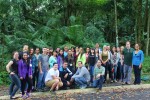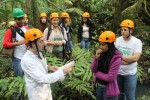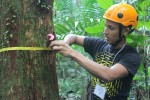This November the Luquillo (LUQ) Long Term Ecological Research (LTER) Schoolyard Program hosted the seventh annual internship for teachers and students from three high schools to learn data collection and management techniques. Nineteen students and four teachers from schools that participate in the LUQ Schoolyard program traveled to El Verde Field Station in the El Yunque National Forest to participate in an extended weekend of ecological activities. The students were very enthusiastic from the beginning, despite a torrential rainstorm that occurred on the day of their arrival. They came well prepared for the rainforest conditions, and the bad weather did not stop them from the challenging task of field data collection.
During their internship, the students were organized into teams and trained by University of Puerto Rico researchers and graduate students in the methods of three data collection protocols within the rainforest setting.
- Using the first protocol, the students studied stream structure and water quality of one of the tributaries of Quebrada Sonadora. Stream structure measurements included stream width, depth, and flow. Water quality measurements included dissolved oxygen, presence of nitrates, phosphate, turbidity, and pH.
- For the second protocol, the students examined forest structure in a permanent study plot established for the internships. The plot is located near the Luquillo long-term forest dynamics plot that is the core of the LTER research project. Program participants measured DBH (diameter at breast height) and height and identified the species of every tree in a given area. Doing so allowed the students to study the dynamics of a plot that is similar in composition to the LTER plot.
- For the final protocol, the students studied soil dynamics along the slope near the LTER forest study plot. They measured soil compaction, infiltration, and moisture at the top, middle, and bottom of the slope.
The students uploaded their data into spreadsheet templates with the help of Dr. Omar Perez Reyes (LUQ), Christopher Nytch (PhD student from the University of Puerto Rico Environmental Sciences Department), Seth Rifkin (Research Manager of the Luquillo Forest Dynamics Plot project), and four volunteer interns. They then analyzed the data, comparing their results with those collected in previous internships.
At the end of the internship, teams comprised of student pairs presented their findings to the internship staff at El Verde. Student teams were limited to four PowerPoint slides within which they presented results from one of the three study areas. One of the four slides had to be a graphical data display incorporating current data and data from previous internships. Emphasis was placed on creativity and communication style in addition to scientific content. All in all, the internship provided students with the opportunity to learn important data collection, management, and presentation techniques that are directly applicable at their school sites, as well as a hub of interchange between schools.
This year we continued to incorporate a mentoring component to the internship. Led by Edaurri Navarro, Melanie Quiñones, and Jose Méndez, all of them undergraduates in the New Mexico-Puerto Rico Natural Resources Career Path (NM-PR NRCP) program, the student mentors assisted with field research activities, photo-documented the weekend’s events, and led a discussion by the high school students that focused on leadership opportunities and the benefits and experiences of participating in the NRCP program.
The high school students left El Verde looking forward to next spring when they will collect data from their school sites and subsequently present their findings at the Luquillo LTER Symposium in May 2015 at the University of Puerto Rico. At that upcoming symposium we plan to continue the cross-site component launched last year in which we virtually share the Schoolyard findings with a group of teachers and students from the Sevilleta Schoolyard LTER’s Bosque Ecosystem Management Program.

 Enlarge this image
Enlarge this image

